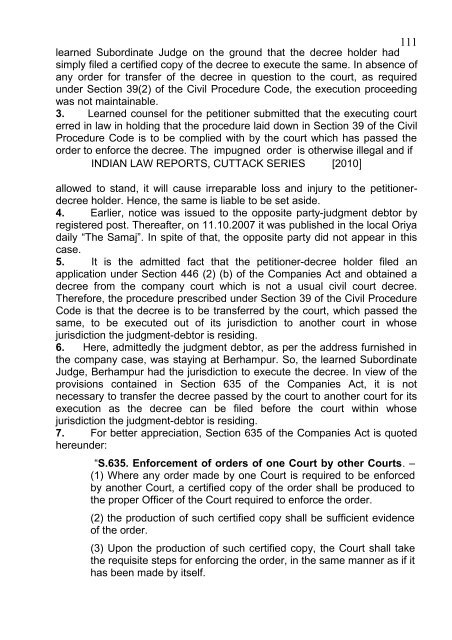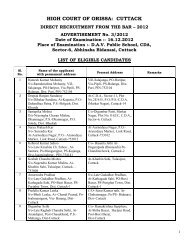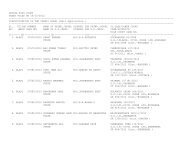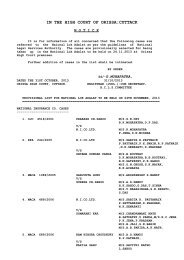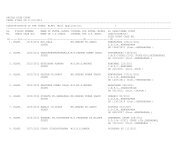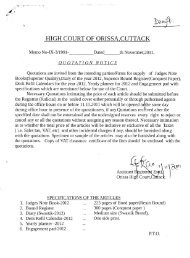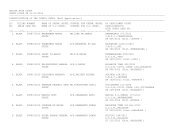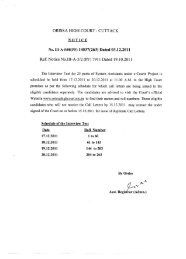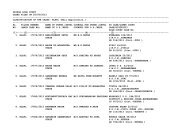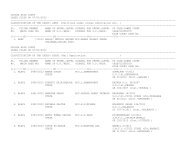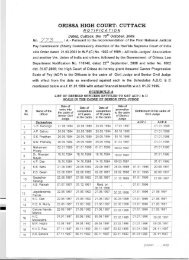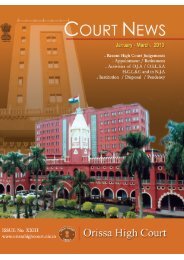ORIGINAL JURISDICTION - Orissa High Court
ORIGINAL JURISDICTION - Orissa High Court
ORIGINAL JURISDICTION - Orissa High Court
Create successful ePaper yourself
Turn your PDF publications into a flip-book with our unique Google optimized e-Paper software.
111<br />
learned Subordinate Judge on the ground that the decree holder had<br />
simply filed a certified copy of the decree to execute the same. In absence of<br />
any order for transfer of the decree in question to the court, as required<br />
under Section 39(2) of the Civil Procedure Code, the execution proceeding<br />
was not maintainable.<br />
3. Learned counsel for the petitioner submitted that the executing court<br />
erred in law in holding that the procedure laid down in Section 39 of the Civil<br />
Procedure Code is to be complied with by the court which has passed the<br />
order to enforce the decree. The impugned order is otherwise illegal and if<br />
INDIAN LAW REPORTS, CUTTACK SERIES [2010]<br />
allowed to stand, it will cause irreparable loss and injury to the petitionerdecree<br />
holder. Hence, the same is liable to be set aside.<br />
4. Earlier, notice was issued to the opposite party-judgment debtor by<br />
registered post. Thereafter, on 11.10.2007 it was published in the local Oriya<br />
daily “The Samaj”. In spite of that, the opposite party did not appear in this<br />
case.<br />
5. It is the admitted fact that the petitioner-decree holder filed an<br />
application under Section 446 (2) (b) of the Companies Act and obtained a<br />
decree from the company court which is not a usual civil court decree.<br />
Therefore, the procedure prescribed under Section 39 of the Civil Procedure<br />
Code is that the decree is to be transferred by the court, which passed the<br />
same, to be executed out of its jurisdiction to another court in whose<br />
jurisdiction the judgment-debtor is residing.<br />
6. Here, admittedly the judgment debtor, as per the address furnished in<br />
the company case, was staying at Berhampur. So, the learned Subordinate<br />
Judge, Berhampur had the jurisdiction to execute the decree. In view of the<br />
provisions contained in Section 635 of the Companies Act, it is not<br />
necessary to transfer the decree passed by the court to another court for its<br />
execution as the decree can be filed before the court within whose<br />
jurisdiction the judgment-debtor is residing.<br />
7. For better appreciation, Section 635 of the Companies Act is quoted<br />
hereunder:<br />
“S.635. Enforcement of orders of one <strong>Court</strong> by other <strong>Court</strong>s. –<br />
(1) Where any order made by one <strong>Court</strong> is required to be enforced<br />
by another <strong>Court</strong>, a certified copy of the order shall be produced to<br />
the proper Officer of the <strong>Court</strong> required to enforce the order.<br />
(2) the production of such certified copy shall be sufficient evidence<br />
of the order.<br />
(3) Upon the production of such certified copy, the <strong>Court</strong> shall take<br />
the requisite steps for enforcing the order, in the same manner as if it<br />
has been made by itself.


